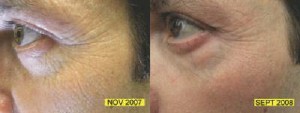Oct 20 2008
Researchers in Germany are describing a potential alternative to Botox and cosmetic surgery for easing facial wrinkles. Their study, scheduled for the November 5 issue of ACS' Crystal Growth + Design, a bi-monthly journal, reports that high intensity visible light from light emitting diodes (LEDs) applied daily for several weeks resulted in "rejuvenated skin, reduced wrinkle levels, juvenile complexion and lasting resilience." LEDs are the miniature lights used in an array of products, from TV remote controls to traffic lights.
 LEDs may help reduce skin wrinkles, researches report. Credit: American Chemical Society
LEDs may help reduce skin wrinkles, researches report. Credit: American Chemical Society
In the study, Andrei P. Sommer and Dan Zhu point out that high-intensity visible light has been used in medicine for more than 40 years to speed healing of wounds. That light actually penetrates into the skin, causing changes in the sub-surface tissue. Until now, however, scientists have not known the physicochemical nature of those changes.
They report identifying how the visible light works — by changing the molecular structure of a glue-like layer of water on elastin, the protein that provides elasticity in skin, blood vessels, heart and other body structures. Figuratively speaking, the light strips away those water molecules that are involved in the immobilization of elastin, gradually restoring its elastic function and thus reducing facial wrinkles. "We are justified in believing that our approach can be easily converted to deep body rejuvenation programs," the researchers state.